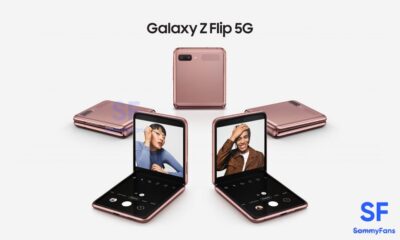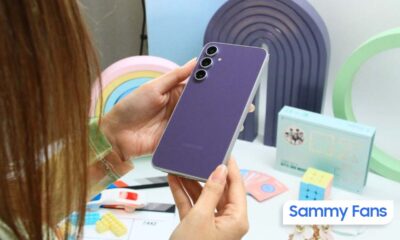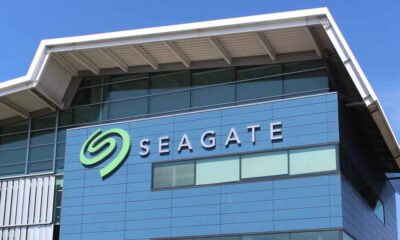News
Verizon expands 5G home and business mobile internet service in new cities

Verizon users can expect the expansion of 5G services from now. Including the home 5G internet and Verizon 5G Business, the carrier announced for both 5G options are now available in Birmingham, Alabama, Fort Wayne, Indiana, and Oklahoma City, Oklahoma.
Similarly, long-distance work residents can enjoy these new homes added to their lineup, and 5G Home will now be available in 60 cities across the United States.
According to an announcement made by Verizon, the 5G Home download speeds increased to 1Gbps with an average download speed of 300Mbps. To attract customers, Verizon also offers up to $500 to pay for the first term payment for those who wish to leave their current internet provider and switch to the local 5G internet.
Join SammyFans on Telegram| Twitter| Facebook
And, the 5G Business Internet is marketed as one of the internet cables. Verizon plans to include professional installations, multiple package prices and service options, and unlimited data as part of its package to attract customers.

Most importantly, professional business users can get a 10-year pricing key – a new long-term contract required – and are willing to offer up to $1,500 to pay the initial settlement fee.
If none of these options work for you, Verizon has announced a number of 5G expansion options, including 5G Ultra Wideband mobile data lines. The 5G Ultra-Wideband will be expanded, allowing users to download and stream movies and TV shows and seconds, and have an instant gaming experience on the go.
For those business customers who need their business line on the go, customers can also enter the mobile hotspot for $30 a month to ensure instant communication while on the go. The 5G Home plans will start at $50 per month per subscription plan, while Business 5G will start at $45 per month and will be available from now.
News
Samsung considers LockStar support for Galaxy S24 AOD customization

Samsung is reviewing LockStar for Galaxy S24 AOD customization. The Korean community’s moderator confirmed that the latest flagship phones don’t support personalization of the always-on-display using Good Lock’s LockStar module.
Thanks to the new screens, Samsung’s Galaxy S24 series brings an iPhone-like Always On Display feature. However, the company seemingly missed bounding it with Good Lock for customization. As a result, users are facing issues tweaking it through LockStar.
However, the latest input confirms that Samsung is considering LockStar support for Galaxy S24 AOD. This will allow users to renovate the always-on-display functionality on their device in various aspects including removal of certain elements.
LockStar doesn’t support AOD customization in the Galaxy S24 series. While an internal review is underway, a possible release may happen shortly. Meanwhile, the moderator hasn’t shared any specific timeline regarding the availability of the support.
Good Lock’s LockStar is one of the most popular plugins for Galaxy customization. Not only the lock screen, the LockStar also lets users tweak the AOD function. The suite will likely add support for the newly released phones well before July Unpacked.
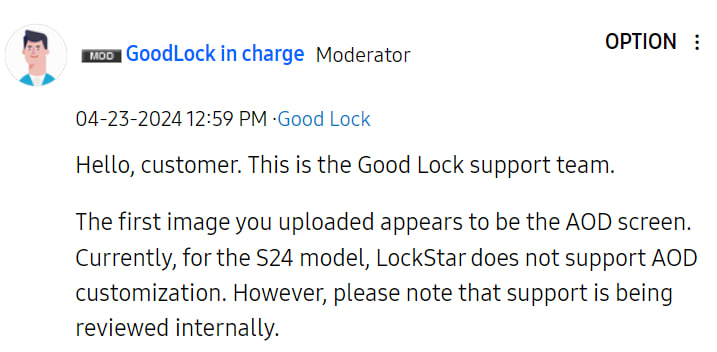
Image: Samsung Community
Stay up-to-date on Samsung Galaxy, One UI & Tech Stuffs by following Sammy Fans on X/Twitter. You can also discover the latest news, polls, reviews, and new features for Samsung & Google Apps, Galaxy Phones, and the One UI/Android operating system.
Do you like this post? Kindly, let us know on X/Twitter: we love hearing your feedback! If you prefer using other social platforms besides X, follow/join us on Google News, Facebook, and Telegram.
News
Beyond Apple, Huawei’s resurgence in China raises concerns for Samsung
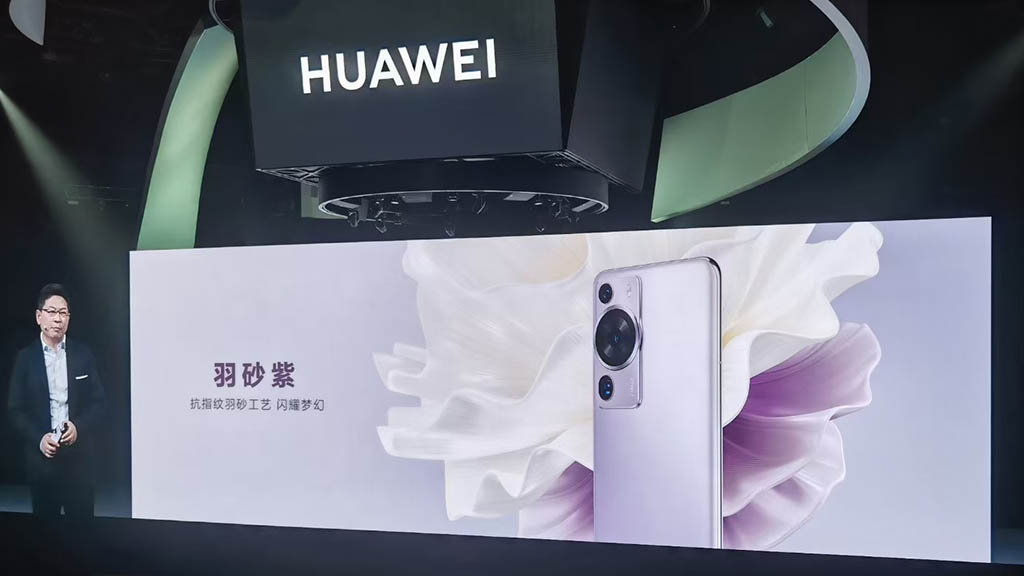
Huawei is making a stunning comeback in its home ground. The company scored a 70% year-on-year growth in its smartphone sales in China in the first quarter. At the same time, sales of Apple dropped by over 19%, reports Counterpoint Research.
The report highlights that the Chinese phone maker is set to outpace Apple in China. As Apple is already facing heat, it’s alarming for all smartphone vendors including Samsung. After Apple, Huawei’s next target will be Samsung which leads the Global market.
Huawei, which was at 9.3% in the first quarter of 2023, jumped to 15.5% in Q1 this year. Apple led the Chinese market in 1Q23 with approximately 20% market share slipped to 15.7% in the first quarter of this year, dropping to the third spot in China.
Earlier, IDC pointed out that Apple is facing a market decline as it lost momentum in China. The local government’s push for local vendors is also helping Huawei to eat Apple’s market. Well, Vivo and Honor were the top two brands by market share.
“Apple’s sales were subdued during the quarter as Huawei’s comeback has directly impacted Apple in the premium segment,” said Ivan Lam, senior research analyst at Counterpoint.
Stay up-to-date on Samsung Galaxy, One UI & Tech Stuffs by following Sammy Fans on X/Twitter. You can also discover the latest news, polls, reviews, and new features for Samsung & Google Apps, Galaxy Phones, and the One UI/Android operating system.
Do you like this post? Kindly, let us know on X/Twitter: we love hearing your feedback! If you prefer using other social platforms besides X, follow/join us on Google News, Facebook, and Telegram.
News
Samsung and Intel team up to power the future of AI PCs
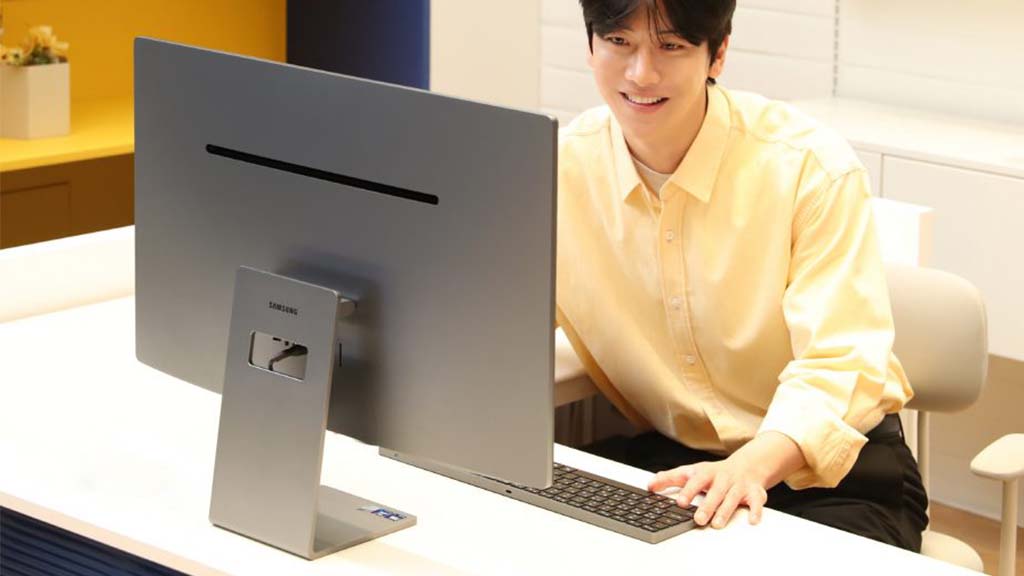
Apart from mobile, Samsung is also focusing on the PC market. The company has recently launched its new all-in-one PC “All-in-One Pro.” At the event, the VP of Intel Korea Samsung Business Division announced the intention to work with Samsung for the AI PCs market.
Galaxy AI is a hit, helping Samsung sell the Galaxy S24 series worldwide. The Korean tech giant is also bringing AI capabilities to its laptop line. Compared to smartphones, laptops, and PCs would offer way better AI features and abilities to bolster productivity.
Samsung’s All-in-One Pro features Intel’s Core Ultra AI PC processor CPU. Thanks to Intel’s external GPU, Arc, graphics performance in the all-in-one PC has also improved twofold compared to the previous generation, and power efficiency has been improved by 25%.
“In this trend where AI is present everywhere, the PC is the product that we experience directly and use for production activities,” stated Bae Tae-won.
As far as AI features are concerned, Intel is committed to offering a complimentary “AI Creator App Package” that consists of the Luminar Neo photo editing software named “Affinity” as well as the Magix video editing application “Vegas.”
Apart from Intel, Samsung also partnered with Microsoft to bring a dedicated Copilot key to the wireless keyboard of the All-in-One Pro PC. Such kind of collaborations offer deeply enhanced user experience as accessing AI-powered Copilot is just a keypress away from you.
Stay up-to-date on Samsung Galaxy, One UI & Tech Stuffs by following Sammy Fans on X/Twitter. You can also discover the latest news, polls, reviews, and new features for Samsung & Google Apps, Galaxy Phones, and the One UI/Android operating system.
Do you like this post? Kindly, let us know on X/Twitter: we love hearing your feedback! If you prefer using other social platforms besides X, follow/join us on Google News, Facebook, and Telegram.

